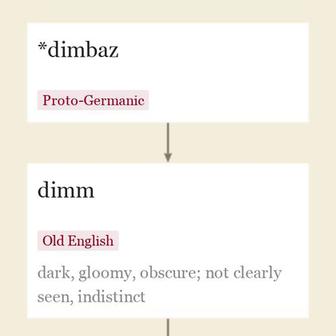dimwit (n.)
也有 dim-wit,“智力迟钝的人”,美国大学俚语,最早出现于1922年,源自 dim(形容词)“强度低”的意思和 wit(名词)“智力”的意思。相关词汇: dimwitted; dimwittedly。
dimwit 的相关词汇

古英语中的 dimm 意为“黑暗的,阴郁的,模糊的; 不清晰可见的”,源自原始日耳曼语 *dimbaz(也源自古诺尔斯语 dimmr,古弗里斯兰语 dim,古高地德语 timber “黑暗的,黑色的,阴沉的”)。在日耳曼语族之外没有被发现。
早在13世纪初,用于形容眼睛“视力不清晰”。从14世纪初开始用于形容声音; 用于形容光线“不明亮,微弱发光”的意思也始于14世纪初。现代俚语中“理解力迟钝,愚蠢”的意义始于1892年; “愚蠢的”意义也出现在中古英语(13世纪中叶)。相关词汇: Dimly; dimness。
"思想能力",古英语 wit, witt,更普遍的是 gewit "理解,智力,感官, 知识,意识,良心", 源自原始日耳曼语的 *wit- (源自 Old Saxon wit,Old Norse vit, Danish vid,Swedish vett, Old Frisian wit,Old High German wizzi "知识,理解,智力,头脑",德语 Witticism German Witz,哥特语 unwiti "无知"),源自 PIE 根源 *weid- "看",比喻为"知道"。相关的是古英语 witan "知道" (来源于 wit (v.))。
"能够将思想联系起来并用幽默的方式表达出来的能力",首次记录于1540年代; "有智慧或学识的人",最初记录于15世纪末。有关用法的微妙之处,参见 humor (n.)。 Witjar 是古俚语(18世纪)表示"头,头盖骨", Witling(1690年代)是指"自认有智慧的人"。
A witty saying proves nothing. [Voltaire, Diner du Comte de Boulainvilliers]
机智的说话毫无意义。[ Voltaire, Diner du Comte de Boulainvilliers ]
Wit ought to be five or six degrees above the ideas that form the intelligence of an audience. [Stendhal, "Life of Henry Brulard"]
机智应高五或六度,才能引起观众的兴趣。[Stendhal,《亨利·Broulard 的生活》]